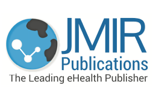Contribute to mHealth research and development of the new JMIR mHealth peer-review tool for mobile apps! We invite you to participate in a survey and give your input for the development of JMIR's new upcoming peer-review tool for mobile apps! There are two different versions of the survey - one for end users of mobile apps, one for developers or companies developing apps Participate now: Survey for consumers/users of health apps: http://goo.gl/hySSgx Survey for developers of health apps: http://goo.gl/Psb5Bo The research and development of this tool is part of a Masters Thesis in Medical informatics at the University of Amsterdam/Academic Medical Center in collaboration with JMIR Publications Inc. and the Centre for Global eHealth Innovation. JMIR mHealth and uHealth is a new journal that will - apart from reviewing and publishing research reports about mHealth apps – also peer-review medical and health apps itself, using a transparent stepwise approach (level 1 disclosure by developers, level 2 evaluation/peer-review by a third party). The idea of a "food label"-like "transparency seals" (displaying metadata from the developer and from third-party rating services) was first advocated and implemented in the context of health websites by the MedCertain/MedCircle projects (http://www.jmir.org/2000/suppl2/e14/). In the framework of this project, there was a structured process consisting of self-certification/disclosure as first step (level 1 certification), complemented by a level-2 evaluation (rating data from third parties). The JMIR level-1 "transparency"/self-disclosure questionnaire has been up since early 2013 on the JMIR mHealth site (Archived by WebCite® at http://www.webcitation.org/6LnG1YU7o) and invites developers to disclose transparency criteria similar to those compiled by Lewis (http://www.jmir.org/2013/4/e89/) and Albrecht (http://www.jmir.org/2013/12/e277) In addition, JMIR mHealth will publish reviews of these apps which will then be submitted to PubMed Central. The article reviews, indexed in PubMed, will often form a first level of experiential evidence, what can be used as input for further research or could be used by consumers as decision enhancer when choosing health related apps. Once multiple mHealth applications have been evaluated, the outcome data of the different steps can then be used to update and revise preceding steps and evaluation strategies of our review tool. Our instruments (level-1 questionnaire and the review-tool) will be subject to frequent revisions. Over time, JMIR mHealth hopes to build up a database of evaluated apps, consisting of a "self-certification/disclosure" by the developer followed by a peer-review of apps (structural evaluation), as well as rigorous research reporting process quality (e.g. usability, usage over time) and health outcomes (e.g. randomized trials). Reviewing and evaluation of the apps will take place in a transparent way and potentially in collaboration with organizations which are already in the process of rating/evaluating/certifying apps or funding bodies which support such work (e.g. foundations). Data of the evaluated apps will then be used to identify important domains within the evaluation of mobile health applications. 


